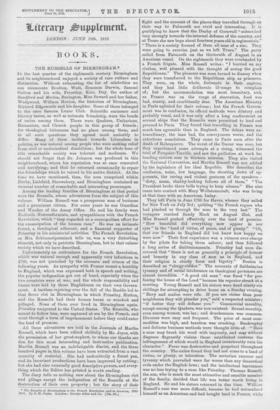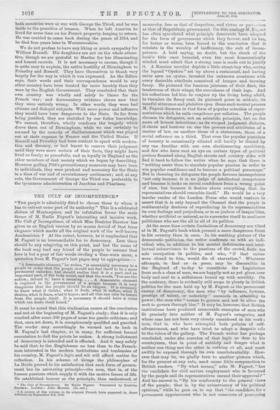BOOKS.
THE RUSSELLS OF BIRMINGHAM.*
Ix the last quarter of the eighteenth century Birmingham and its neighbourhood enjoyed a society of rare culture and distinction. Without exhausting the list of celebrities we can enumerate Bonlton, Watt, Erasmus Darwin, Samuel Gallon and his wife, Priestley, Keir, Day, the author of Sandford and Merton, Berington, Miss Seward and her father, Wedgwood, William Hutton, the historian of Birmingham, Richard Edgeworth and his daughter. Some of these belonged to the once famous Lunar Club. Scientific eminence and literary tastes, as well as intimate friendship, were the bonds of union among them. There were Quakers, Unitarians, Romanist% and Church people in this group of friends ; for theological bitterness had no place among them, and in all such questions they agreed most amicably to differ. Many of them inclined towards Liberalism in politics, as was natural among people who were seeking relief from civil or ecclesiastical disabilities ; but the whole tone of this remarkable society was tolerant and moderate. We should not forget that Dr. Johnson was produced in this neighbourhood, where his reputation was at once venerated and terrifying; and that he returned occasionally to repair the friendships which he valued in his native district. At the time we have mentioned, then, the area comprised within Derby, Lichfield, Shrewsbury, and Birmingham contained an unusual number of remarkable and interesting personages.
Among the leading families of Birmingham at that period were the Russells, whose adventures form the subject of this volume. William Russell was a prosperous man of business and a prominent citizen. For some years he was Guardian and Warden of the Assay Office. He and his family were Radicals, Nonconformists, and sympathisers with the French Revolution, which "they regarded as a cosmopolitan effort for the emancipation of the human race." He was an intimate friend, a theological adherent, and a financial supporter of Priestley in his ministerial activities. The French Revolution, as Mrs. Schimmelpenninck tells us, was a very disturbing element, not only in patriotic Birmingham, but in that calmer society which we have described.
Unfortunately an enthusiasm for the French Revolution, which was natural enough and apparently very infectious in 1789, was not quenched by the excesses and crimes of the following years. As sympathy with France meant a hostility to England, which was expressed both in speech and writing, the popular indignation got out of hand, especially when the two countries were at war, and the whole responsibility and blame were laid by these Englishmen on their own Govern- ment. A tactless rejoicing over the fall of the Bastile led to that fierce riot in Birmingham in which Priestley, Hutton, and the Russells had their houses burnt or wrecked and pillaged. None of them ever lived in Birmingham again. Priestley emigrated to the United States. The Russells, who meant to follow him, were captured at sea by the French, and went through a term of imprisonment before they could enter the land of promise.
All these adventures are told in the Journals of Martha Russell, which have been edited skilfully by Mr. Jeyes, with the permission of her great-nephew, to whom our thanks are due for this most interesting and instructive publication. Martha Russell was an indefatigable diarist, and the three hundred pages in this volume have been extracted from a vast quantity of material. She had undoubtedly a fluent pen, and its luxuriant productions have been improved by cutting; but she had also unusually good descriptive powers, and every- thing which the Editor has printed is worth reading.
The diary tells us nothing new about the Birmingham riot and pillage except the indignation of the Russells at the destruction of their own property ; but the story of their
Tia Russells of Birmingham in the French Resautiott and in Amorioa, 1791- Ibid. JJ S. H. Joyos. London : George Allen and 00. Mo. 6d. J flight and the account of the places they travelled through on their way to Falmouth are vivid and interesting. It is gratifying to know that the Duchy of Cornwall "subscribed very strongly towards the internal defence of the country, and at Truro she saw boys about fourteen years old in regimentals." "There is a society formed of them all near of a size. They were going to exercise just as we left Truro." The party sailed from Falmouth on the thirteenth of August in an American vessel. On the eighteenth they were overhauled by a French frigate. Miss Russell writes : "I hurried on my clothes, well pleased with the thought of seeing the good Republicans." The pleasure was soon turned to dismay when they were transferred to the Republican ship as prisoners. They were, on the whole, fortunate in their captors, and they had little deliberate ill-usage to complain of; but the accommodation was most insanitary, and, as France was on the verge of starvation, food was bad, scanty, and. exorbitantly dear. The American Ministry in Paris agitated for their release ; but the French Govern- ment was in confusion, its official methods were dilatory and probably venal, and it was only after a long confinement on several ships that the Russells were permitted to land and proceed to Paris. They found that travelling in France was much less agreeable than in England. The delays were ex- traordinary, the inns bad, the conveyances worse, and the extortions scandalous. They came to Paris soon after the death of Robespierre. The worst of the Terror was over, but they experienced some attempts at a rising, witnessed the trial of Fouquier-Tinville, and saw the guillotine at work be- heading sixteen men in thirteen minutes. They also visited the National Convention, and Martha Russell was not edified by the legislators of her ideal Republic. She describes the confusion, noise, low language, the shouting down of op. ponents, the raving and violent gestures of the speakers- " dirty, mean, shabby-looking fellows all of them." "Time President broke three bells trying to keep silence." She also came into contact with Mary Wollstonecraft, who was living at that time with an American, Imlay.
They left Paris in June 1795 for Havre, whence they sailed for New York on July 3rd; quitting "the French rogues who had pinched us through the nose to the very last." The voyagers reached Sandy Hook on August 21st, and Miss Russell gushed effusively over the land of promise. "How beautiful did everything now appear in our eyes" in the "land of virtue, of peace, and of plenty." "Oh, that our friends in England did but know how happy we were now." Their first experience was a ruinous over-charge by the pilots for taking them ashore ; and then followed a long series of disillusionments. Priestley had soon dis- covered that "there is not as generally a principle of honour and honesty in any class of men as in England, and their religion is chiefly form and bigotry." Boston is described as "clergy-ridden." The accounts of Sabbatarian tyranny and of social intolerance on theological pretences are almost incredible. "A good old man" was fined "for pro- faning the house of the Lord" because his repeater struck at a meeting. Young Russell and his sisters were fined ninety-six shillings for attempting to drive home on a Sunday evening. " Envy and malice were rife. If you are richer than your neighbours they will plunder you," said a respected minister; "if better they will defame you." Commercial morality, except among the Quakers, was non-existent. Sexual morality, even among women, was lax ; and drunkenness was common. Divorces were easy and frequent. The price of most com- modities was high, and taxation was crushing. Bankruptcy and dubious business methods were thought little of. "Here a man may break his word with impunity, and may without disgrace flagrantly violate those established customs the infringement of which would in England irretrievably ruin his character." Fever was destructive and perpetual throughout the country. The exiles found they had not come to a land of virtue, or plenty, or toleration. The sectarian rancour and tyranny which prevailed were far worse than any theoretical evils under the English laws ; and the intellectual barrenness was no less trying to a man like Priestley. Thomas Russell, the eon, who is much the most attractive and sensible member of the family, decided that life was better worth living in England. He and his sisters returned in due time. William Russell's case was more difficult, because be had naturalized himself as an American and had bought land in France, while
both countries were at war with George the Third, and he was liable to the penalties of treason. When he left America he lived for some time on his French property, longing to return. He was enabled to come back during the peace of 1814, and he died four years later in Worcestershire.
We do not profess to have any liking or much sympathy for William Russell. His daughters are not on the whole attrac- tive, though we are grateful to Martha for her illuminating and honest records. It is not necessary to excuse, though it is quite easy to explain, the active hostility of Birmingham to Priestley and Russell. They have themselves to thank very largely for the way in which it was expressed. As the Editor says, their words and their correspondence would in any other country have been treated far more harshly than they were by the English Government. They concluded that their own country was wholly and solely to blame for the French war; and documentary evidence shows now that they were entirely wrong. In other words, they were bad citizens and disloyal subjects. With more power and influence they would have been dangerous to the State. So far from being justified, they are stultified by our fuller knowledge. We cannot, therefore, wholly condemn the tragedy which drove them out of Birmingham, while we can certainly be amused by the comedy of disillusionment which was played out at their expense in France and the United States. If Russell and Priestley had been content to speak with modera- tion and decency, or had learnt to reserve their judgment until they were more certain of their facts, they might have lived as freely, as peacefully, and as loyally in England as the other members of that society which we began by describing. However galling Pitt's precautionary measures may have been to individuals, they were prudent and necessary for the State in a time of war and of revolutionary excitement ; and, at any rate, the Government of George the Third was preferable to the tyrannous administration of Jacobins and Pharisees.























































 Previous page
Previous page